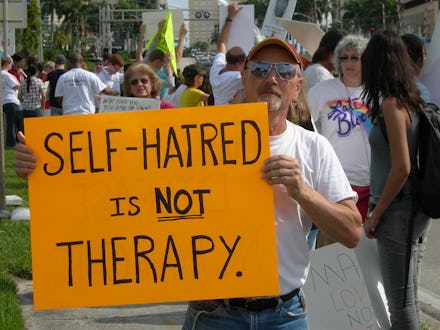The U.S. Government Is Taking a Big Step Torward Ending LGBTQ Conversion Therapy

Halfway through LGBT History Month, a federal agency says it's time to make conversion therapy history.
A new Substance Abuse and Mental Health Services Administration report, "Ending Conversion Therapy: Supporting and Affirming LGBTQ Youth," blasts the notions that conversion therapy is useful to young LGBTQ people or that it's a useful way to deal with human sexuality.
"Conversion therapy perpetuates outdated views of gender roles and identities as well as the negative stereotype that being a sexual or gender minority or identifying as LGBTQ is an abnormal aspect of human development," the report reads. "Most importantly, it may put young people at risk of serious harm."
The movement to ban conversion therapy, also known as "ex-gay therapy" or "reparative therapy," has gained steam in recent years. California was the first to ban the practice in 2012; New Jersey, Washington, D.C., Oregon and Illinois soon followed suit.
Of the five bans, two were signed in the past six months. A New Hampshire lawmaker introduced legislation this week to ban the practice in that state.
The report outlines three key findings. First, it states that various sexual and gender identities, behaviors and expressions are a normal aspect of human diversity and not reflective of mental disorders. Second, it says no research exists showing that conversion therapy can actually do what it claims to do. Third, it demonstrates that conversion therapy is harmful and should not be a valid form of treatment for LGBTQ youth.
Rather than aiming to change sexual or gender identity, behavior or expression, the report says, therapy for LGBTQ youth should aim to provide accurate information on sexual and gender diversity, increase family and school support and address rejection.
"The goal of treatment [should be] the best possible level of psychological functioning, rather than any specific gender identity, gender expression or sexual orientation," the report said.
The report also outlines three specific ways to fight conversion therapy: reducing discrimination and stigma against LGBTQ people, training health care providers to properly address diverse sexualities and gender identities and enacting legislation to do away with the practice.
While banning conversion therapy is extremely beneficial, the report repeats a single point many times: the need to make healthier LGBTQ adults. Currently, LGBTQ adults face a host of mental health problems at much higher rates than their heterosexual counterparts — many of which can be traced back to the stigma and discrimination behind LGBTQ conversion therapy.
"Adolescents are figuring out who they are, and it's important to be supportive and affirming of your child and to engage in that process of identity development in a way... that's not harmful to them," Sean Cahill, director of health policy research at the Fenway Institute in Boston, told Reuters.
According to Fenway Health, LGBT people are more likely to abuse alcohol and drugs. In some LGBT populations, this abuse is linked with HIV transmission, an epidemic among transgender women and gay and bisexual men. LGBT people also face higher rates of depression, anxiety and suicidal ideation, Fenway says, pointing to "minority stress," the reality that many people who experience prejudice internalize that prejudice and become depressed or anxious, as a source of many of these disparities.